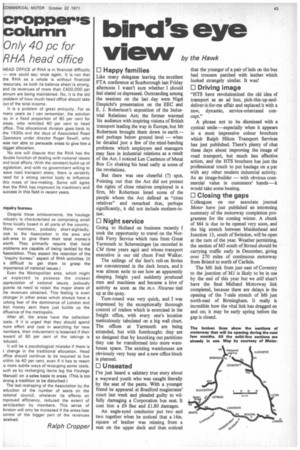c ropper's c olumn
Page 45

If you've noticed an error in this article please click here to report it so we can fix it.
Only 40 pc for HA head office
HEAD OFFICE of RHA is in financial difficulty — one could say: once again. It is not that the RHA as a whole is without financial resources, as both its balance sheet is strong, and its revenues of more than £400,000 per annum are being maintained. No, it is the old problem of how much head office should take out of the total income.
It is a problem of great antiquity. For as many years as I can remember, the solution lay in a fixed proportion of 60 per cent for areas, who remitted 40 per cent to head office. This allocational division goes back to the 1930s and the days of Associated Road Operators under director Roger Sewill, who was not able to persuade areas to give him a bigger allocation.
No one will dispute that the RHA has the double function of dealing with national issues and local affairs. With the constant build-up of egislation, and with no government willing to eave road transport alone, there is certainly leed for a strong central body to influence this mass of law-making. Some will agree that the RHA has improved its machinery and success in this field in recent years, nquiry bureau
Despite these achievements, the haulage Industry is characterized as comprising small firms locally based in all parts of the country. Many members, probably short-sightedly, ook to the Association in the area and sub-area to give them their total money's North. They primarily require that local problems are capable of being tackled by the 4ssociation. They expect the retention of the -inquiry bureau" aspect of RHA activities. (It s difficult to get them to grasp the mportance of national issues.) Even the Metropolitan area, which might 3e expected to possess the closest sppreciation of national issues, jealously guards its need to retain the major share of the revenues obtained. This feeling is even stronger in other areas which always have a urking fear of the dominance of London and :hat money sent there just builds up the sffluence of the metropolis.
After all, the areas have the collection .....osts. If it is urged that they should spend nore effort and cost in searching for new nembers, their inducement is lessened if their .eward of 60 per cent of the takings is 'educed.
It will be a psychological mistake if there is change in the traditional allocation. Head pffice should continue to be required to live within its 40 per cent, even if it has to resort :o more subtle ways of recouping some costs, such as by recharging items leg the Haulage Vlanual) on a sales basis to areas. (This is too strong a tradition to be disturbed.)
The last reshaping of the Association by the eduction of the number of seats on the tational council, whatever its effects on mproved efficiency, reduced the extent of )articipation by members. This sense of iivision will only be increased if the areas lose xpntrol of the bigger part of the revenues .eceived.
Ralph Cropper








































































































